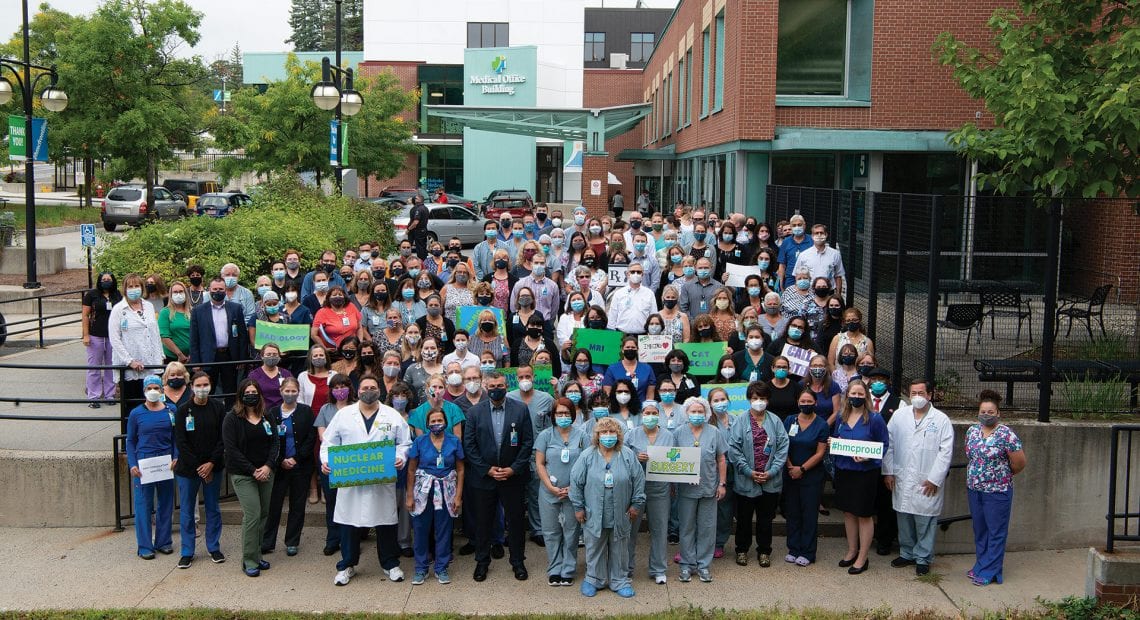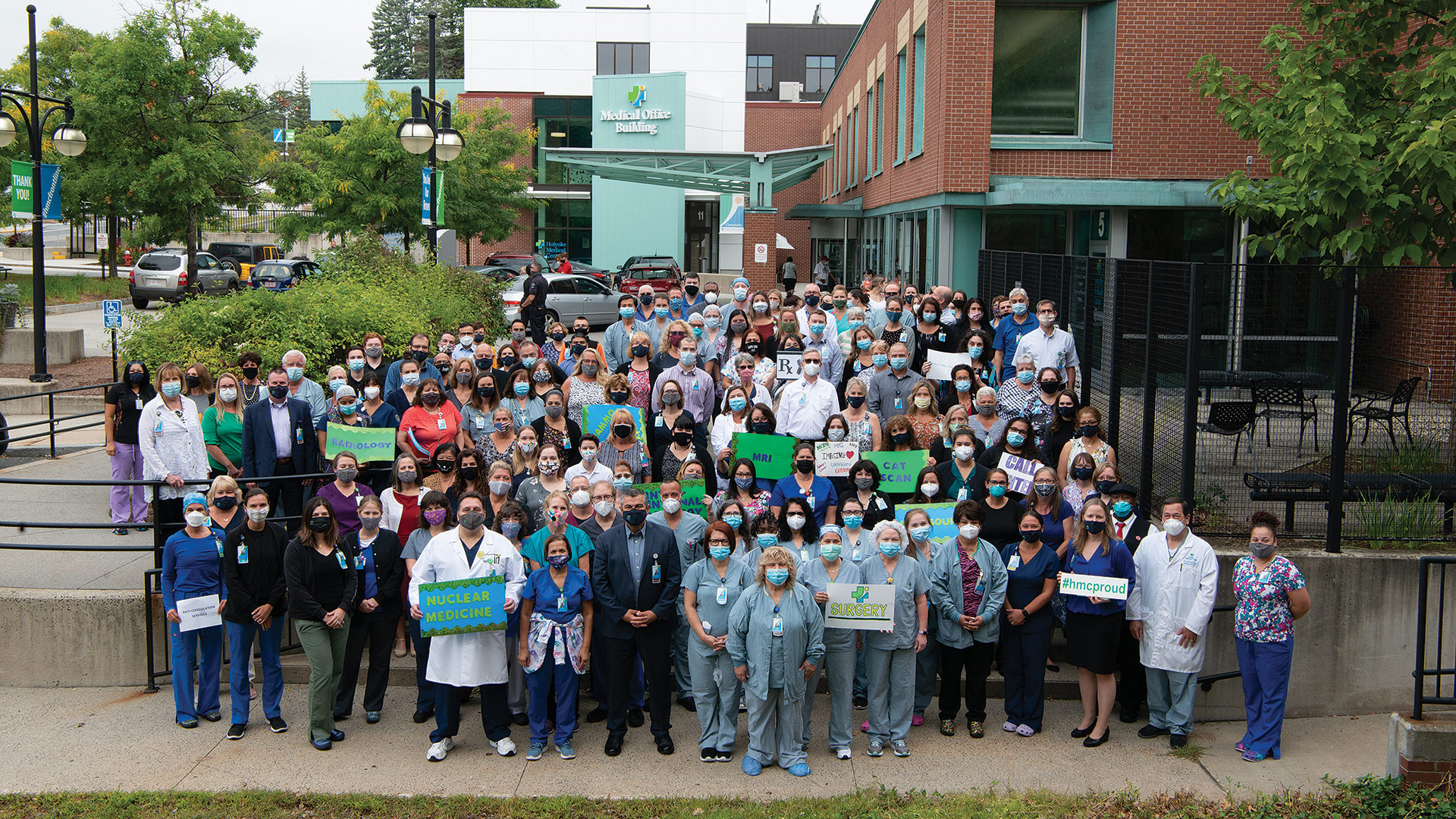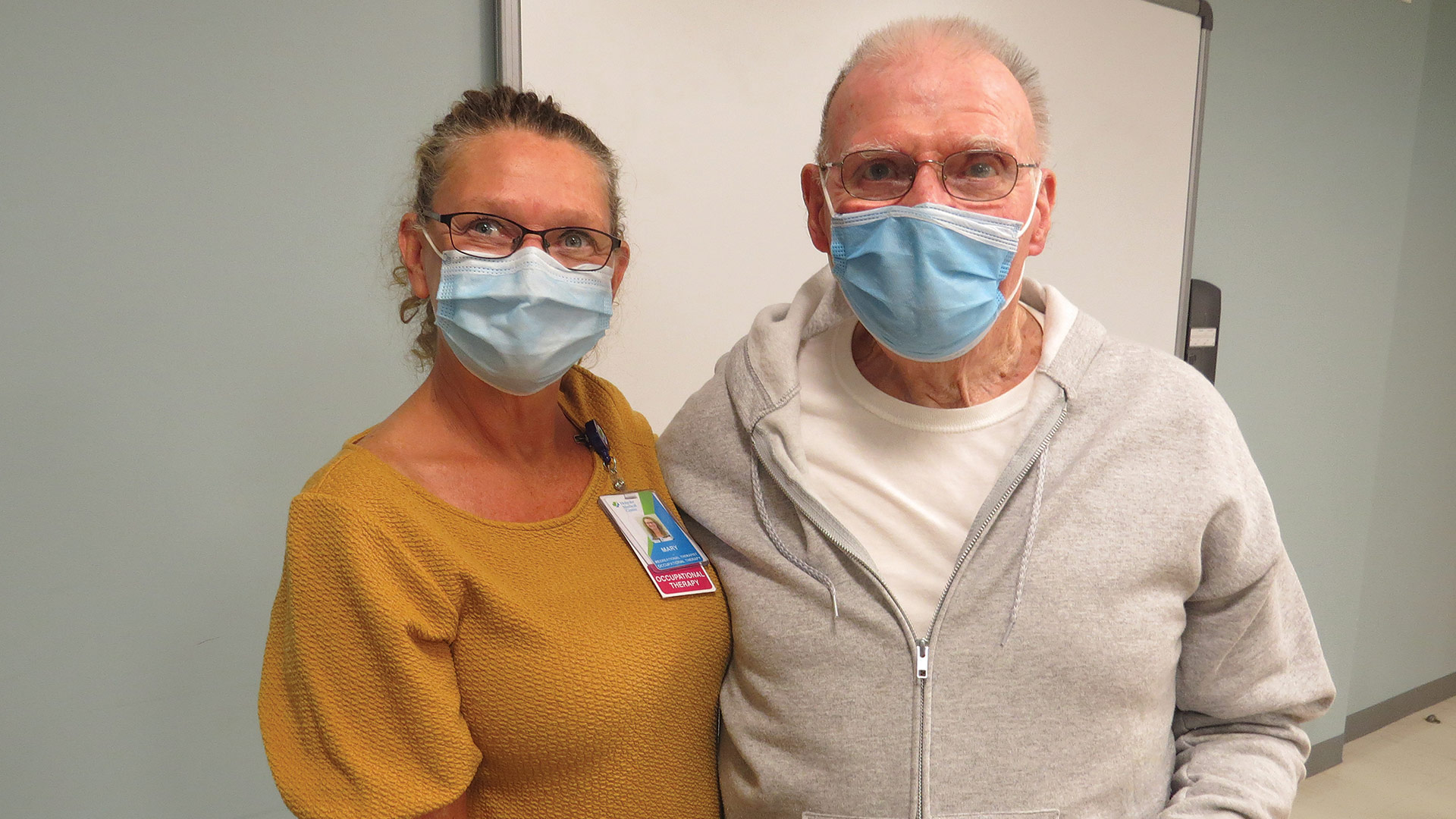
The Staff of Holyoke Medical Center
Amid the Crisis at the Soldiers’ Home, This Small Army Answered the Call

The Staff of Holyoke Medical Center
It was coming up to noon on Friday, April 4, and the staff at Holyoke Medical Center was frantically working to ready facilities there for the arrival of residents of the nearby Holyoke Soldiers’ Home, who needed to be relocated in the midst of a tragic COVID-19 disaster that would make headlines across the country.
Carl Cameron, HMC’s chief operating officer, who was overseeing that work, was on the phone with his boss, hospital President and CEO Spiros Hatiras, who was telling him that some promised National Guard personnel would likely soon be arriving from the Soldiers’ Home to help with the massive and complex undertaking.
Cameron’s response more than sets the tone for a truly inspiring story that most still haven’t heard, but certainly should.
“I told him that at that point not to bother,” he recalled. “Because we had our own army of people. And it was absolutely outstanding and amazing how that team came together and got this done.”
“We had our own army of people. And it was absolutely outstanding and amazing how that team came together and got this done.”
Indeed, HMC’s small army, which would grow in numbers in the coming days and weeks, as we’ll see, came together in every way imaginable to bring 39 residents of the home into a hospital that was in the early stages of the COVID-19 fight itself. An acute-care hospital, HMC was not in the business of providing long-term care. But, to borrow a phrase from hockey, it shifted on the fly, and essentially got into that business.
There was a learning curve — staff members were certainly not used to people in HMC’s beds making requests (better make that demands) for their favorite brand of beer — but they did learn, and they made the veterans/patients/residents feel at home at an extremely difficult time.
They decorated the hastily created living spaces with flags and red, white, and blue ornaments. They found the soldiers television sets. They provided much-needed information and comfort to those soldiers’ family members, many of whom had no idea where they were. They’ve helped a few of their guests celebrate 100th birthdays since their arrival. Outpatient physical therapists were taken off furlough to become veterans’ liaisons, helping the Soldiers’ Home residents with daily functions as well as helping them maintain connections with loved ones. Office assistants stepped in to assist with patient care.
Summing it all up, Hatiras said his staff came together, as perhaps never before, amid a crisis that tested the medical center on every level imaginvable — and earned the designation of Healthcare Hero for 2020 not only from BusinessWest, but from the Huron Studer Group, one of only four such awards that organization issued across the entire U.S.
Spiros Hatiras
“Everyone put their roles aside and said, ‘all hands on deck.”
“Everyone put their roles aside and said, ‘all hands on deck,’” Hatiras noted, summoning still more military language as he praised every department in the hospital, from Plant Operations to Communications to Environmental Services, for the specific roles they played. “And what we’ve learned, aside from all the bonding and being more comfortable in different roles, is that we’ve technically become much more astute. We’ve learned things from a technical standpoint that would allow us to respond to a second wave or other kind of pandemic, because now we’ve got it right; we know how to convert rooms under pressure, we know how to isolate people, we know how to shift things around, we know how to use alternative ways. We’ve learned so much by going through this.”
As several of those involved with this herculean effort talked with BusinessWest about it, much of the discussion focused on that first day and night — and for a reason.
The hard work of setting up spaces for the soldiers — an outpatient cardiac-services unit and a maternity unit that has seen declining volume for several years — had been completed by mid-afternoon — as noted, without the help of the National Guard.
As he talked about the mad dash to get the rooms ready, Angelo Martinez, a member of the Plant Operations team, spoke for everyone in the room when he spoke of those who be staying in those rooms.
“At end of the day, I was tired, but it was a good feeling,” he said. “Because these veterans did a lot for us, and we owe them for all they’ve done.”
Those units were ready by 3 p.m., the end of a shift for many of those involved. But just about everyone stayed until those soldiers finally started arriving by van in the early evening. And they stayed on until the last of them arrived around midnight. And still they stayed on until the soldiers were settled into their new quarters.
Kaitlyn Nadeau, a surgical technologist, was one of them. She told BusinessWest she was unaware that the hospital was taking on the veterans because it had been a busy day in the operating rooms. When she learned, around 3 in the afternoon, she and others went about setting out a welcome mat.

Korean War Veteran Richard Madura, seen here with recreational therapist Mary Argenio, is one of 39 veterans who found a new home at Holyoke Medical Center.
“We made hearts to put on the walls because … it’s a basement, and it’s white walls, and it’s kind of scary when you walk in,” she explained. “So we decorated it like we were going to stay there. Because if it were my grandparents coming in … most of these people are confused as is, and they’re coming to this facility they’ve never been to.
“So we decided we were going to stay there,” she went on. “Hours went by, and they still hadn’t arrived because it’s quite the process to get them here. Finally, I said, ‘let’s get more people down here.’ My boss just started grabbing people from everywhere; people from the command center showed up, and managers from other departments, and CNAs … everyone just came together, including people I’d never met before in my life, to welcome them here and get them settled in.”
This coming together as a team during that first 24 hours or so set the tone, but it was really only the first chapter in a story that, seven months later, is still being written.
Indeed, soon after the veterans arrived, some began showing signs of the virus, meaning more space would have to be readied for these guests, and single rooms would be needed to slow and hopefully stifle any spread.
Also, the hospital, and especially its nursing staff, had to pivot to providing long-term-care services.
“Being an acute-care hospital, we’re not normally planning things out for long-term-care residents,” Nurse Manager Christina Straney said. “But many of our nurses have worked in long-term care, so they stepped up and said, ‘let me take this, let me run with this, let me show you what we do in nursing homes and how we care for patients.’”
Meanwhile, some of the certified nursing assistants had worked at the Soldiers’ Home and recognized some of the patients, she went on, adding that this helped create a fluid, almost seamless transition for the veterans.
Likewise, the furloughed physical therapists stepped into their new roles as veterans’ liaisons, a role that came about out of necessity, Hatiras explained.
“We had the matter of individual preferences,” he said. “I would get on a Zoom call, and I would have family members say, ‘remember, Ed doesn’t eat eggs, and he doesn’t like mayo, and he takes his tuna fish this way, and he likes his newspaper every morning’ … and I’m like, ‘whoa, how am I going to remember all this stuff?’”
The solution was to assign liaisons to each of the veterans. Jeff Ferriss is one of them. He was furloughed on a Friday and called back to work the following Monday to serve in this unique role.
“My father was a veteran — he spent 20 years in the Air Force. My brother spent four. And I’m also a veteran — I was in the National Guard and the Air Force Reserves,” he said. “So this was the perfect transition for me; I was happy to come back and help out. Our job was to keep the family members informed, but being therapists, we tried to goad them into therapy too. Some of them may not have wanted to do that, but over time, they needed to — they were stuck in their rooms, and we were trying to keep their minds going and keep them going physically. It’s been an honor to serve these people.”
Veterans like Richard Madura. A Korean War vet, he will tell you (without much prodding, by the way) that, through his 85 years, he’s been fortunate enough to be in the right place at the right time — on most occasions.
Indeed, the long-time Chicopee resident arrived in Korea just as the truce between the warring factions was being signed. And when it looked like he was ticketed for taking up a gun and maintaining the peace along the DMZ, an officer who noticed on his résumé that he had musical experience and had been part of some polka bands, let him take up a clarinet in an Army band instead. To make a long story shorter, his band entered a string of talent contests, ultimately won first prize, and wound up on The Ed Sullivan Show.
Madura told BusinessWest that this habit of being in the right place extends to his current, but certainly not permanent, mailing address at Holyoke Medical Center.
“They take really good care of you here,” he said, not wanting to compare the facilities to those he left just up the hill at the Soldiers’ Home, although he did hint that the desserts are better — and larger — at HMC. “I’m fortunate to be here; we all are.”
Indeed they are. A small army answered the call last April, and it is still answering the call, making the staff at HMC a true Healthcare Hero in a year when there are many to celebrate.
George O’Brien can be reached at [email protected]





